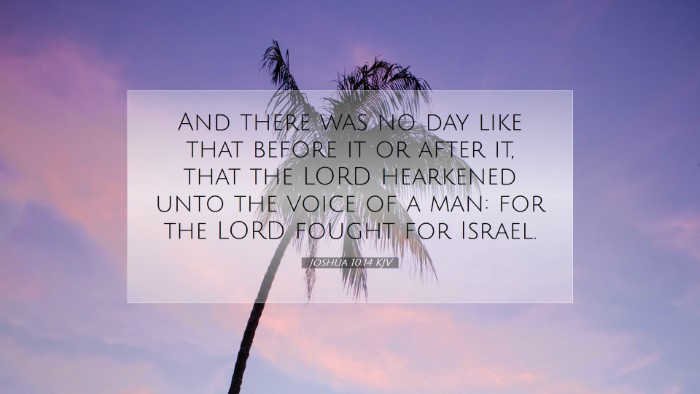Commentary on Joshua 10:14
Joshua 10:14 states, "And there was no day like that before it or after it, that the LORD hearkened to the voice of a man: for the LORD fought for Israel." This profound statement captures a significant moment in biblical history, where divine intervention aligns with human action. Below is a synthesis of insights from renowned public domain commentaries.
Historical Context
The backdrop of this verse is the battle of Gibeon, where Israel faced the five kings of the Amorites. As Joshua led the Israelites into battle, his plea to the Lord for an extension of daylight for the victory illustrates an extraordinary collaboration between divine sovereignty and human endeavor. Commentators emphasize that this event reflects God’s commitment to His covenant people.
- Matthew Henry notes that this day was unique; the Lord’s response to Joshua’s command showcases His willingness to intervene on behalf of His chosen people, thus affirming the power of earnest prayer.
- Albert Barnes elaborates that the phrase "no day like that" suggests a distinction not just in events, but in the nature of God's engagement with humanity. This battle exemplifies God's active role in guiding Israel's fate.
- Adam Clarke stresses the miraculous nature of the event, emphasizing that such phenomena indicate God's control over the natural order, underscoring His omnipotence and readiness to assist His people when they act in faith.
Theological Implications
This verse raises essential theological points regarding God's relationship with humanity, particularly concerning prayer, faith, and divine providence.
- Intercession and Prayer: The notion that God listened to "the voice of a man" reinforces the significance of intercessory prayer. Here, Joshua’s boldness in prayer exemplifies how believers can petition God actively, expecting Him to work mightily.
- Divine Sovereignty: The declaration that "the Lord fought for Israel" encapsulates the sovereignty of God in the affairs of men. The commentary from Matthew Henry highlights that this victory was solely attributed to God's direct intervention and guidance, reminding believers of His overarching authority.
- The Role of Faith: The context of Joshua’s plea indicates that faith can lead to extraordinary outcomes. Clarke points out that faith emboldened Joshua to request an act that transcended natural law, which God honored because it aligned with His purpose for Israel.
Literary Analysis
The verse is crafted to convey a sense of urgency and uniqueness. The literary devices employed, such as hyperbole in claiming "no day like that," serve to magnify the extraordinary nature of the events that unfolded. This stylistic approach invites readers to reflect on the gravity of this moment in salvation history.
- Symbolism of Light: The extension of daylight can be viewed symbolically, representing God’s illumination in times of darkness and His provision of hope in seemingly insurmountable challenges.
- Convergence of the Human and Divine: The joining of Joshua’s voice and God’s action illustrates the dynamic relationship between humanity and the divine. It emphasizes God's readiness to act in response to faithful leaders, which is a theme echoed throughout the Scriptures.
Application for Today
For contemporary practitioners of the faith—pastors, students, theologians, and scholars—this verse offers rich applications:
- Encouragement for Prayer: Just as Joshua boldly prayed and acted, modern believers are encouraged to bring their requests before God, confident that He hears and acts.
- Understanding God's Sovereignty: The affirmation that the Lord fights for His people challenges believers to trust in God's power and timing in their lives, especially in times of struggle.
- A Call to Faithful Leadership: Joshua’s example serves as a model for leaders today to engage both in fervent prayer and decisive action, trusting in God's guidance and provision.
Conclusion
Joshua 10:14 presents a remarkable intersection of faith, prayer, and divine action. It stands as a testament to God's ability to respond to His people when they act in faith, challenging today’s believers to invoke divine intervention through earnest prayer while trusting in God’s sovereign will. The insights from notable commentators enrich our understanding of this pivotal moment, inspiring current generations to seek God fervently and participate actively in His kingdom work.


